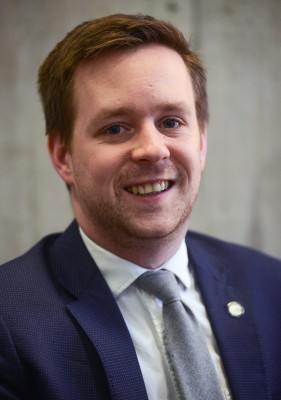
Boston is the start-up community’s new Petri dish.
The many successful students and companies that make up the city of Boston already provide for an environment designed for start-up innovation, and now, Boston Mayor Martin Walsh has added his bit to the mix. Enter StartHub, the entrepreneurship program that’s aiming to be local start-ups’ connection to City Hall.
Walsh has named Rory Cuddyer to lead the program, which will have a physical location, the Roxbury Innovation Center in Dudley Square, by the end of 2015. During his time as advisor to the mayor’s chief of staff, Cuddyer gained some experience with the start-up community, helping local entrepreneurs navigate through issues and keeping a usually tedious, tiresome and overwhelming process relatively smooth, he said. Now that he’s working with start-ups full-time, Cuddyer’s initial plans include lots of chitchat.
“We’re going to be having conversations with the community at large, and it’s really going to be a collaborative approach,” Cuddyer said. “They are going to help us identify what the city is doing well, what the city needs to improve upon and then what the city can actually do to help them.”
Cuddyer said although it’s early, most of the policies he’ll be pursuing will come from those conversations. He believes the community best understands their own needs and challenges, which is why he plans to start small.
Through his appointment as “start-up czar,” Cuddyer provides local start-ups with an actual face in City Hall to go to with issues. While StartHub is still in its very early phases — it has yet to introduce any policies — the program and the city government, he said, are all-ears to hear what Boston’s entrepreneurs have to say.
Yet while the main focus right now is on an open dialogue, StartHub is also aiming to keep the local business ecosystem strong. The hope, Cuddyer said, is that Boston’s abundance of universities can provide a significant flow of fresh ideas and venture capitalists. Ideally, these factors will yield a flow of capital, as well as accelerators and incubators, all combining to produce a city of successful entrepreneurs.
Ian Mashiter, a lecturer in Boston University’s School of Management and the director of the BUzz Lab, BU’s own entrepreneurship center, sees this flow of ideas between the city and the universities as a possibility. The BUzz Lab not only has a workspace where student teams can run through ideas, but also holds business model competitions, boot camps and other activities to stimulate student entrepreneurs on campus.
“What entrepreneurs need are ecosystems that support them as they found their companies and grow their companies,” he said. “Some cities are better than others in terms of ecosystems, and Boston traditionally has always been a very strong entrepreneurial ecosystem.”
Fellow BUzz Lab contributor and executive-in-residence at BU’s Institute for Technology Entrepreneurship, Vinit Nijhawan agrees Boston is “definitely a great place to do a start-up.” Having served as CEO of three of his own start-ups, Nijhawan reemphasized Boston’s fantastic economic ecosystem while also claiming that changing labor markets have something to do with Boston start-ups’ success as well.
“There was a time … where you worked at a company for your whole life. Then you came to my generation where, not only have I not worked at one company my whole life, but I’ve switched careers three times in my life,” Nijhawan said. “I think with [the current] generation increasing, it’s pretty unlikely [they’re] going to stay in one thing for [their] whole career. Those skills that you learn being an entrepreneur are really valuable in this new sort of dynamic labor market.”
But he has a suggestion for StartHub: don’t discount entrepreneurship in immigrant communities. With a lot of focus aimed toward technology start-ups, other businesses such as retail shops, restaurants or laundromats, he said, are overlooked.
“I think the city can really do a better job in really helping those types of entrepreneurs … The concepts of entrepreneurship or start ups have been around for a long time, but it has really started gathering speed in just the last five to 10 years” he said. “You can even see it at BU, where there’s a lot of focus on innovation and on entrepreneurship at the university partly because the nature of labor markets is changing.”
In truth, though, that sort of inclusion may not be so far off from what Cuddyer and his team have in mind.
“We want to make sure that any resident who has great talent has the resources to actually start a business,” he said. “And that’s what the city is really trying to do.”













